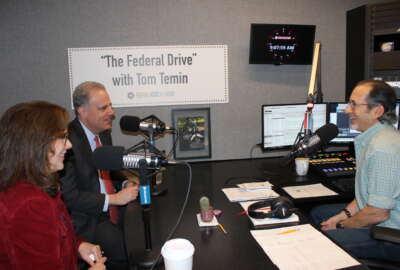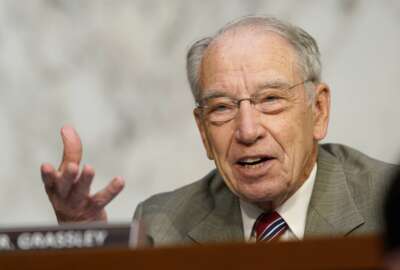Hubbard Radio Washington DC, LLC. All rights reserved. This website is not intended for users located within the European Economic Area.
On Air: Federal News Network
Trending:
Low morale? You’re not alone, new federal survey shows
Sequestration? Furloughs? Pay freeze? Fed bashing? Poor leadership? The list of morale killers goes on and on. A new Federal News Radio survey on employee moral...
As Congress and the White House duke it out over sequestration and the possibility of agency furloughs, morale in the federal workforce is understandably low.
In January, Federal News Radio conducted an anonymous online survey on federal morale and leadership. The survey asked managers and employees what morale levels were like in their offices and what factors had the greatest impact on office morale.
The response was loud and clear — the majority of the 2,880 who responded to the survey said their own morale level was low, and they rated the morale level in their offices even lower.
The top three “morale killers,” according to federal employees, were, in order, pay freezes, ineffective leadership and fed bashing from Congress and the public.
“I like my job but hate the anti-gov worker attitude,” one federal employee wrote. “We work hard. Very few slackers here.”
Another employee agreed. “The public does not perceive my job or my contributions as valuable. Congress views us as expendable.”
While federal managers picked the same three morale killers, they ranked them in a slightly different order, naming ineffective leadership as the worst offender, followed by pay freezes and fed bashing.
“Listening to employees who are discouraged because they are bringing home less money is very disturbing and affects the morale of the entire workforce,” wrote one federal manager. “If my morale is low then it will reflect on the employees, so as managers we have to try to boost morale.”
Another federal manager said work was no longer as enjoyable due to low office morale.
“Now I keep wondering if I will be furloughed tomorrow or be able to meet my house payment,” he wrote. “For some reason, the public seems to think all feds get paid like the ones in D.C. Some of us make from $26,000 to $60,000 a year. This is going in reverse with the increase in insurance, taxes and whatever Congress thinks we owe the world.”
Breaking down the numbers
The survey asked federal employees to rank their morale level, on a scale from 1 to 10, with 10 being extremely high and 1 being extremely low. Of those who responded, 47.8 percent said their own morale was at a 3 or below.
Using the same scale, 46.1 percent said the overall morale level of their colleagues in the federal workforce was 3 or below.
Of the 2,880 who took the survey, 22.6 percent (652) were federal managers and 75.1 percent (2,162) were federal employees. Also, 58.2 percent (1,667) were male and 41.8 percent (1,195) were female. Their years in federal service broke down as follows:

In their responses to the morale questions, federal managers rated their morale and that of the overall workforce slightly higher than their employees did.
On the same 1 to 10 scale, 41.4 percent of federal managers said their own morale was at a 3 or below.
In addition, 45.3 percent of managers said the overall morale level of the federal workforce was 3 or below.
Managers rated morale in their own offices a little better, with just 39.8 percent saying levels were at a 3 or below.

Numbers have changed little since January 2012
The results of the latest survey mirror those of a similar survey Federal News Radio conducted in January 2012. In that survey, managers and employees identified the same three issues — the pay freeze, fed bashing and ineffective managers — as the top three morale killers.
“I think clearly living in the Beltway area we have a lot of federal bashing certainly, and the federal employees have been a target from the Congress over the past couple of years in terms of the pay freeze and other restrictions,” said Miriam Cohen, chief human capital officer at the Nuclear Regulatory Commission, in an interview with Federal News Radio after the survey was completed. “It certainly doesn’t help when we have other agencies that maybe have run afoul of some regulations in terms of conferences and those types of activities. So, I think that has just put a general damper on the federal employee environment.”
Cohen added the results of the two surveys shouldn’t surprise anyone familiar with human capital matters in the federal workplace.
“If you look at the Federal Employment Survey results and what the Partnership for Public Service (PPS) has done with the [Office of Personnel Management] results when they have put out their Best Places to Work and looked at the trends over the past couple of years, they’re fairly consistent,” she said. “I think in some cases, scores have gone down because the general environment has also declined over the past couple of years, so I don’t think anyone who looks at those results should be surprised.”
“From 2002 to 2012, the single most important factor leading to an increase in employee engagement is leadership in every single organization in the federal government,” said Bob Tobias, director of Key Executive Programs at American University. “Better leadership means more engagement and more engagement means more productivity. Lack of leadership means decreased productivity. It’s incredibly important. It has been important in the past and my prediction is that it’s going to be important in the future.
Effect of leadership on employee morale
Federal News Radio included several questions in the 2013 survey on the topic of leadership, to coincide with the release of our special report, Top Leaders in Federal Service.
The survey asked employees and managers how important good leadership was to office morale on a 1 to 10 scale, with 1 being extremely unimportant and 10 being extremely important. The majority of respondents (37.5 percent) gave it a 10 rating.
“I can’t imagine what our office would be like if we did not have the leadership encouraging the employees to hold their heads high and keep up the good work,” wrote one respondent.
Cohen called leadership a key factor in maintaining high morale levels among employees. “You have to have people at the top who are committed to what the organization is doing,” she said.
Max Stier, president of PPS, agreed that nothing was more important to the quality of government than good leadership.
“Where you have weak leadership, you have employees that are suffering and less satisfied and committed to their work,” Stier said. “It’s the most important driver of employee satisfaction and commitment and represents close to 60 percent of the factors that drive that satisfaction and commitment. It’s a big deal.”
Low marks for promoting good leaders
While good leadership may be extremely important to maintaining morale and the quality of government, survey respondents gave the government low ratings when it came to promoting good leaders within their organizations.

When the survey asked employees and managers whether they agreed with the statement, “Government agencies have the the tools they need to grow good leaders,” the results were mixed. The majority (49.4 percent) said they either “somewhat agreed” or “strongly agreed” with the statement, while 34.9 percent said they either “somewhat disagreed” or “strongly disagreed”
“Current leaders, if they have the skill, generally lack the time to train rising leaders,” one respondent wrote in comment to this question. “Our agency lacks adequate funding and organization to train rising leaders.”

The survey also asked federal employees and managers whether they agreed with the statement, “Good leaders are being promoted within my agency.” Of those responding, 67 percent either “strongly disagreed” or “somewhat disagreed” with the statement.
One respondent wrote promotions were “inconsistent and not always based on merit,” and another said, “No opportunities for promotion. Must apply to other organizations.”
Tobias said these results mirrored the findings of other surveys and studies. One possible cause he pointed to was the tendency of the government to promote “subject matter experts” rather than individuals with the capacity to lead.
“So, those who are promoted continue being subject matter experts,” he said. “They don’t have the time or the interest in creating relationships with those they lead. As a result, there’s less engagement and less productivity.”
In order to promote better leaders, the government needs to focus more closely on who it is selecting to lead and, more importantly, supporting them once they have been promoted, Tobias said.
“If I have a conversation with you about whether or not you want to lead and I say, ‘You ought to apply for the job because it’s going to pay you more money,’ that’s one approach,” he said. “If I have a conversation with you and say, ‘You know, if you choose to lead, you’re going to have to give up being a subject matter expert. You’re going to have to redefine yourself in terms of the success that you achieve working with other people, as opposed to the success that you have working alone.’ You’re giving someone an idea of what it means to lead. Those conversations rarely occur.”
Training better leaders
“It has been noted well a lot of times leaders are selected for promotion based on their technical abilities versus their supervisory abilities, and we’ve called on federal agencies to try to evaluate what they require out of leaders and select people based on those leadership qualities versus the technical skills,” said Dr. Peter Leeds, a research psychologist in the Merit Systems Protection Board’s Office of Policy & Evaluation.”So, we have a challenge with that and we’re trying to address it by improving selection through that method.”
Leeds said agencies already have some tools at their disposal to foster better leadership. Agencies should start by holding managers accountable for how they lead.
“Leaders and supervisors need to be held accountable for demonstrating good leadership and good supervision,” he said.
Although leadership training is available, Leeds admitted that in times of tight budgets, agencies may have less to spend on such training.
“Leadership training remains a challenge, but it is something agencies can do to grow leaders,” he said.
Another option is giving leaders structured developmental opportunities as they take on more responsibilities. Coaching others can also help leaders to hone their leadership skills.
“The tools exist,” said James Tsugawa, acting director of MSPB’s Office of Policy & Evaluation. “Whether agencies invest in them or use them is a different matter. Certainly, a few years back, there was legislation to require training for supervisors and that’s consistent with a need that our research identified to not only improve how supervisors are selected but to improve the coaching, support, as well as the accountability after they’re put in the job. We have the tools, but we need to make better use of them to cultivate leaders.”
Tsugawa said he suspects that hasn’t been a priority for the federal government.
“It’s going to be particularly tough now because there are fewer resources available, and time for supervisors and leaders is stretched,” he said. “Agencies are really going to have to try to make the time to do things like coaching, providing feedback, sharing information. It’s especially critical now with so much uncertainty. But it’s also going to be tough to do.”
Leaders doing it for themselves
Bill Spencer, MSPB clerk, said that given the austere times agencies are facing, it may be up to the supervisors and managers themselves to take the reins on their development and training.
“Training is often one of those things that’s first on the chopping block,” he said. “However, there are numerous free, available opportunities for folks to network, to become associated with professional associations, to do self-directed training, book reading, developmental assignments and other ways in which an individual can take it upon themselves to become the kind of leader that they aspire to be and that, frankly, agencies need.”
One resource available to managers looking to up their leadership expertise is to participate in today’s online chat with Center for Leadership Development and Federal Executive Institute. The chat runs from 11-11:30 a.m.
Ask your questions live. Or, leave them now in by emailing Federal News Radio’s Executive Editor Jason Miller.
More From the Special Report: Top Leaders in Federal Service:
Online Chat: Ask the Leadership Expert
Low morale? You’re not alone, new federal survey shows
When the going gets tough, good leaders lead
Making a difference … the right way
GSA’s Godwin sees employees as her ‘greatest resource’
Parker leads IRS Chief Counsel’s legal processing staff to success
Pelberg creates supportive environment to help IRS staff succeed
CDC’s Rothwell epitomizes ‘top shelf’ leadership
Four generations of public service help Williams succeed at Energy
Top Leaders in Federal Service — Nominee List
Copyright © 2024 Federal News Network. All rights reserved. This website is not intended for users located within the European Economic Area.
Michael O'Connell
Michael O’Connell is senior digital editor of Federal News Network optimizing content for the best user experience. Follow @moconnellWFED
Follow @moconnellWFED





